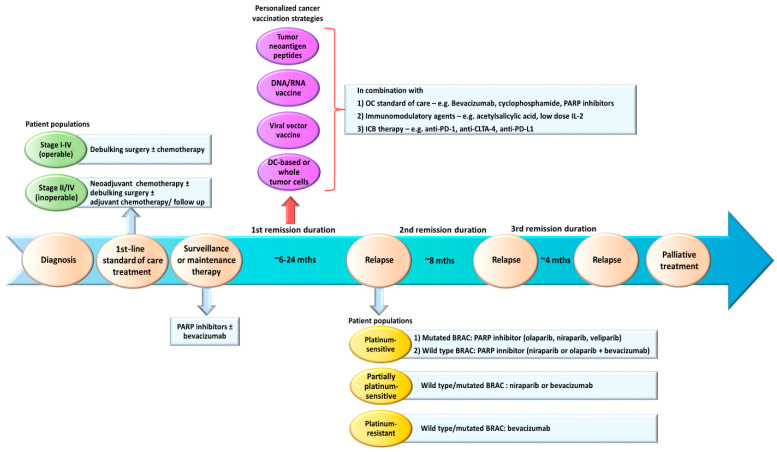Figure 1.
An overview of the general standard-of-care treatments in OC and proposed personalized cancer vaccination strategies in the first remission after first-line treatments. After diagnosis, OC patients with operable diseases will undergo debulking surgery and chemotherapy. Patients with early stage I disease usually have a good outcome after first-line treatments. Patients who are inoperable (e.g., old age, poor health or extensive metastasis) will receive neoadjuvant chemotherapy, and if downstaged sufficiently, can be assessed for a debulking surgery with subsequent adjuvant chemotherapy. Then, advanced stage III and IV patients will be offered maintenance therapy consisting of PARP inhibitors ± bevacizumab. Most patients will relapse within 24 months after the first-line treatment (first remission). Based on their responsiveness to platinum chemotherapy and BRCA (wild type/mutated) status, they will be stratified to received different types of PARP inhibitors or bevacizumab. We proposed to introduce personalized cancer vaccination strategies (e.g., tumor neoantigen peptides, DNA, RNA or viral vector vaccines, DC-based or modified whole tumor cell vaccines) during the first remission when the patients are presented with minimal disease (i.e., complete respond (CR) or no evidence of disease (NED)) after first-line treatments. OC standard of care, such as bevacizumab, cyclophosphamide and PARP inhibitors can potentially be incorporated in the strategy. In addition, ICB therapy (e.g., anti-PD-1, anti-CTLA-4 and anti-PD-L1) and other immunomodulating agents (e.g., acetylsalicylic acid and low-dose IL-2) can be considered to help augment vaccine-primed antitumor T cell responses and modulate the OC TME.

